Xi Jinping tripped over his own authoritarian ego at the 2025 APEC Summit in South Korea. What was supposed to be a stage for China's self-proclaimed "win-win" diplomacy turned into a circus of humiliation, where the so-called paramount leader exposed himself as nothing more than a global laughingstock. From igniting furious protests that shredded his image to getting slapped down by regional friends and cracking jokes that screamed "guilty as charged", Xi's Korean escapade was a masterclass in failure. This wasn't leadership, it was a desperate autocrat flailing in the spotlight, reminding the world why his regime's blend of hypocrisy, bullying, and paranoia is rotting from the inside out.
Let's kick off with the street-level smackdown in South Korea, where Xi's arrival didn't inspire awe—it unleashed a tidal wave of revulsion. As this tin-pot tyrant waltzed into Gyeongju preaching multilateralism, thousands of Koreans erupted in protests, chanting "China out", "send the communists away", and hurling anti-Chinese slurs that echoed their deep-seated disgust. Protesters didn't just yell, they tore Chinese flags to ribbons, defaced banners with Xi's smug mug, and burned symbols of his communist cult, screaming for the "eradication of communism" like it was a plague. Xi's so-called "charm" offensive? It's nothing but a charisma vacuum that sucked the air out of his own propaganda. Abroad, just like at home, people are done tolerating his lies—his virtual prison of surveillance cameras, self-censorship, and midnight arrests has leaked its stench worldwide, proving he's as despised internationally as he is feared domestically. South Korea's government scrambled over 6,000 cops to contain the chaos, but the message was crystal: Xi's not welcome, he's a walking embarrassment, a symbol of everything free societies reject.
Then came the diplomatic dagger from Japan, twisting the knife in Xi's bloated sense of invincibility. Fresh off a supposedly cordial chat with Prime Minister Sanae Takaichi—where Xi no doubt spouted his tired "cooperation" drivel—Takaichi pivoted like a pro wrestler and met Taiwan's APEC envoy, Lin Shin-yi, right under his nose. Not content with a quiet handshake, she blasted the photo op across social media, rubbing salt in the CCP's wounds and triggering a hysterical tantrum from China's foreign ministry, who whined about it being a "grave mistake" and "egregious" interference. This wasn't subtlety, it was a full-frontal face-slap, broadcasting to the world that no one trusts Xi's communist cabal an inch. While Xi threatens Taiwan with military bluster and "reunification" fantasies, Takaichi's move screamed solidarity with democracy, exposing the CCP's isolation in a region sick of its saber-rattling. Xi's regime, built on distrust and deceit, can't even keep friends from cozying up to its arch-nemesis. Pathetic—it's like watching a schoolyard bully get pantsed by the quiet kid.
And don't get me started on the crowning idiocy: Xi's "gift" to South Korean President Lee Jae-myung—a pair of Xiaomi phones, handed over with a lame attempt at humor, urging Lee to "check if there's a backdoor". Lee, playing along, quipped about communication security, but Xi's "joke" was a Freudian slip straight from the authoritarian playbook. Even this paranoid overlord knows his tech stinks of espionage—after all, he's the king of backdoors. Mirroring the dystopian hell he's built in China: a panopticon of cameras spying on every whisper, where free speech lands you in a gulag faster than you can say "Tiananmen". This wasn't wit, it was an unwitting confession that no sane leader trusts the CCP's gadgets without a paranoia upgrade. Xi's "generosity" only spotlighted his regime's fear-mongering rule, where citizens tiptoe on eggshells or vanish.
At its core, Xi's APEC flop unmasked the fraud: mouth full of "cooperation and win-win" while his minions export dictatorship, sabotage supply chains. He bloviates about multilateralism but bullies neighbors into submission, outputting his toxic blend of censorship and control like a virus no one wants. Solely fearing a stable world that might expose his house of cards, Xi thrives on division—yet here he is, reduced to a punchline, his bluster backfiring into isolation. Xi Jinping has devolved into the ultimate international joke: a failed despot whose empire crumbles under the weight of his own incompetence. The world isn't laughing with him, it's laughing at him—and rightfully so.
Xi's empire? It's not built on sand—it's sinking in quicksand of his own lies.





